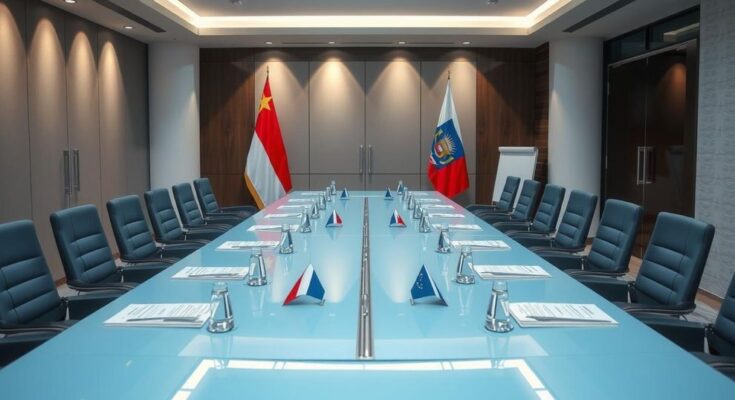An Emirati diplomat met with Iran’s Foreign Minister carrying a letter from U.S. President Donald Trump aimed at initiating discussions over Iran’s nuclear program. Iran remains skeptical, as Khamenei rejects negotiations with the U.S., citing economic pressures and regional instability. The meeting highlights ongoing tensions surrounding uranium enrichment levels and the geopolitical implications of both military and diplomatic strategies.
In a significant diplomatic engagement, an Emirati diplomat, identified to be carrying a letter from U.S. President Donald Trump, convened with Iran’s Foreign Minister Abbas Araghchi in Tehran. This meeting arrives during tumultuous times for Iran, grappling with economic difficulties intensified by persistent U.S. and Western sanctions over its advancing nuclear program. Although the specific contents of the letter remain undisclosed, it was directed to Supreme Leader Ayatollah Ali Khamenei, who has expressed his resistance to negotiations with what he perceives as a “bullying government.”
Khamenei’s public remarks suggest skepticism about the U.S.’s intentions, highlighting that Iran possesses the capability to respond effectively to military threats. Reports indicate that earlier this week, he labeled Trump’s letter as an effort to mislead public perception. Despite the Emirati visit being unannounced and occurring during Ramadan, it emphasizes the UAE’s pivotal role in maintaining robust ties with the United States.
Having previously engaged in a diplomatic letter exchange with North Korean leader Kim Jong Un, Trump’s approach towards Iran seems to parallel this tactic, though it lacks specified incentives for the Iranian regime. Khamenei’s offense against Trump’s prior letter effort illustrates the complexities in negotiating with a nation under significant strain from international pressure and sanctions.
With Iran’s uranium enrichment nearing weapons-grade levels, the stakes for a potential military conflict with Israel and the United States have heightened. As Tehran insists its nuclear ambitions are for peaceful purposes, regional instability has been exacerbated by ongoing conflicts, including the ongoing Israel-Hamas war. The depreciation of Iran’s currency and rising unemployment compounded by civil unrest highlight the multifaceted challenges the country faces.
The consequences of Trump’s renewed pressure and the dynamics unfolding in Iran illustrate a tense interplay of diplomacy and military considerations. The international community remains vigilant as developments continue to shape the geopolitical landscape.
The meeting between the Emirati diplomat and Iran’s Foreign Minister underscores the complexities surrounding U.S.-Iran relations, particularly amid Iran’s nuclear advancements and economic challenges. Despite Trump’s overtures, skepticism from Iran’s leadership reflects deeper national sentiments against perceived U.S. aggression. As geopolitical tensions rise, especially with uranium enrichment nearing critical thresholds, the potential for a military confrontation looms. Such circumstances necessitate careful navigation by all parties involved as they grapple with the intricate realities of diplomacy and conflict.
Original Source: www.nsnews.com




